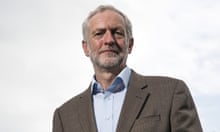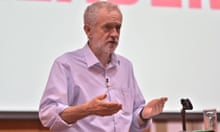“In an age when authenticity is increasingly valued by voters, he walks tall”: the tribute was paid by Andrew Mitchell, former cabinet minister and Conservative whip, one-time director at Lazard and officer in the Royal Tank Regiment. But who is this colossus of whom he speaks? Jeremy Corbyn, that’s who.
You may be inclined to suspect Mitchell of ulterior motives; of psychological gamesmanship, encouraging the opposition to choose a leader who is, in fact, unelectable. But Mitchell’s admiration for Corbyn is genuine. They have been friends for many years, and, along with David Davis and Andy Slaughter, went to Washington DC in May to lobby for the immediate release of Shaker Aamer, a British resident – and detainee at Guantánamo Bay since 2002.
My straw poll of Tories and their response to the Labour leadership contest is not remotely scientific, but revealed certain unmistakable trends. Yes, there are some who cannot disguise their glee at Corbyn-mania and their general disdain for the mediocrity of the contest. Complacent Tories are not a pretty sight.
Yet there are surprisingly few of them, truth to tell. One cabinet member says that Corbyn’s leadership “would drag the overall debate to the left and the tiny risk of his victory would be a catastrophe for Britain”. This Tory sees a more likely political difficulty arising from Corbyn’s defeat and victory for Andy Burnham or Yvette Cooper being misinterpreted as a triumph for Labour moderation when, in this cabinet member’s opinion, Burnham and Cooper are actually “running left”. In other words: Corbyn’s failure, after so much hoopla, would threaten to re-define the centre ground and, by definition, make the Tories look more rightwing. Still following? There’ll be a test at the end.
I have not spoken to a single Tory who thinks that Liz Kendall has a chance, though several told me that she would have been a formidable prospect in 2020, with five years more frontline experience and media calluses. There is genuine bafflement that the Blairite faction, once so ruthlessly organised, has effectively left Kendall stranded behind enemy lines, and a measure of respect for her on the Conservative side for staying the course.
As David Cameron grows used to a Commons majority of only 12, as opposed to the 76-seat total he enjoyed during the coalition years, he needs a plausible Labour opponent to maintain discipline on the Tory benches. The 1992-97 parliament – a horror movie that Cameron and George Osborne watch again and again, lest they forget – is a lesson in the power of untamed factional power on the backbenches. Well before Tony Blair became Labour leader in 1994, the Maastricht rebels had shattered the Tory party’s reputation for loyalty. Cameron and his successor (that is, the Conservative leader who will fight the 2020 election) require a Labour leader plausible enough to compel Tory backbench discipline in the fiendishly difficult European negotiations ahead, and the referendum itself.
So: the Tories’ preferred Labour leader would be plausible – but not too plausible. As between Burnham and Cooper, even the most obsessive Labour-watchers on the Conservative side find themselves struggling. “Which shade of grey is more dangerous?” says one of Cameron’s allies. “One is best known as Ed Balls’s wife and the other was the less impressive member of the [James] Purnell-Burnham duo. How do you choose between them?” Ouch.
On balance, the Tories worry more about Cooper. The Whitehall officials who served under New Labour as well as the Cameron administrations speak of her more warmly than of Burnham, which counts for a lot with this generation of senior Conservatives. Many of them served apprenticeships as special advisers to senior ministers – the so-called spadocracy - and learned at an early age to listen to civil servants and to mine their memories. If the mandarins rate Cooper, they say, it is with good reason.
Also, I suspect the Tory tribe fears her more than Burnham for reasons that would repay Freudian analysis. Although the progress of gender equality in the Conservative party has been slow – all but 68 of its 330 MPs are men – it was for many years, and to some extent still is, a matriarchal sect. Though the style of today’s senior Tories owes more to Blair, and the ethos of the Cameron government is explicitly the centrism of one-nation Conservatism, the contemporary party remains the child of Margaret Thatcher. Paradoxically, many Tories still find it easier to imagine a woman in No 10 than becoming an MP (though you can’t have one without the other, guys). That’s their hang-up. But it also helps to explain why they are ever so slightly frightened of the personable Ms Cooper.
Even if Corbyn loses, he will remain a force in his party – and beyond. Those Tories who want to see Britain remain in the EU do not like one bit his hints that he is open to taking on a senior role in the out campaign. And in a broader sense, the sort of Conservatives who think intelligently and strategically – and there are more of them than you think – fret that a bearded 66-year-old socialist has ignited political debate in a way that absolutely nobody in the mainstream predicted. He has stormed through the crash barriers of contemporary politics as if they weren’t there, presenting the ideals of the left as if they were brand new and absolutely tailored to the needs of our age. He has shown that party modernisation of the sort that Blair championed for 13 years is as brittle as balsa. What message does that have for Cameron, whose modernisation strategy has been much less consistent and committed than Blair’s?
The general election result suggests that the conventional rules of politics have not changed: on which basis Labour would – if Corbyn became leader – split, lose, and perhaps do both. The Tories would be the conspicuous beneficiaries.
But what if the rules have changed? What if Corbyn’s moment in the sun is more than an anomaly, a quirk, an exception that proves the rule? The smart politician allows for such possibilities. Which is why smart Tories, far from gloating, are asking themselves if this is the start of something; and if so, of what?







